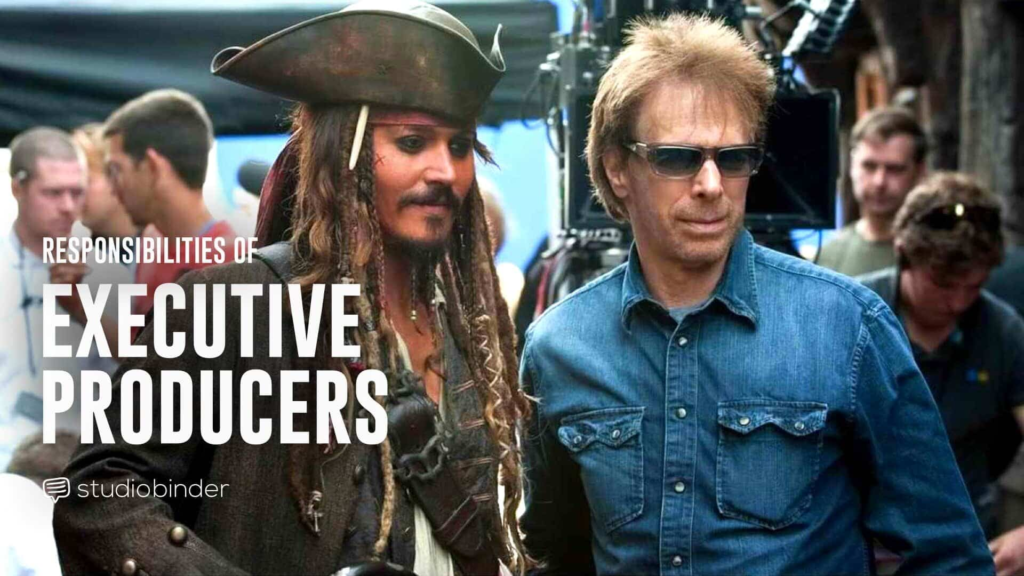Executive Producer (1 years diploma)
Executive Producer click here
Brief Job Description: Individuals in this job need to ensure the successful
creation of content, and manage the twin goals of achieving the creative vision
and meeting cost objectives. (Note: international terminology for this role is
“Producer”, however in the Indian context the “Producer” is typically the
financier.)
Personal Attributes: This job requires the individual to manage the production
process and make decisions at different stages of production. A background in
management studies/ business administration and/ or content production is
preferred. The individual must know how to prepare a production budget. The
individual must have good presentation skills to pitch concepts and secure

funding from financers. The individual must be a strong leader and guide/
groom to different heads of department and team members to help them
successfully deliver their product within their budget and timeline.
Description
Budget Budget is an estimate of the total cost of production that may include a
break-up of cost components
Continuity Continuity represents the seemless transition from one shot to another
Copyright Laws A legal framework linked to intellectual property and the rights given to
creators of original products/ concepts
Financer An entity (individual or organization) that provides financing for a project
Labour Laws Legal norms governing the relationship between workers, employers,
trade unions and the government
Post-production Post-production is the final finishing phase of the production, where the
raw footage is edited, special effects are added, music and sound are
integrated, colour correction is done etc.
Props A property, commonly shortened to prop (plural: props), is an object
used on stage or on screen by actors during a performance or screen
production. In practical terms, a prop is considered to be anything
movable or portable on a stage or a set.
Screenplay Screenplay is the script coupled with key characteristics of the scene and
directions for acting
Script Script is a structured narrative of a story
Set The background/ scenery visible through the camera (for video
production) or directly to the spectator (for theatrical production)
Set Etiquette A set of guidelines that dictate how cast and crew should behave on set
and interact with each other
Target Audience Group of people at whom content/ adverting is aimed. A target audience
is typically defined by age, gender, economic classification, geography
and any other relevant parameters (e.g. Femals, aged 25-40, average
monthly household income INR 25,000-50,000, from Hindi speaking
states in North India)
Timelines Timelines is a listing of dates by which the production milestones/stages
need to be completed
Sector Sector is a conglomeration of different business operations having similar
businesses and interests. It may also be defined as a distinct subset of the
economy whose components share similar characteristics and interests.
Sub-sector Sub-sector is derived from a further breakdown based on the
characteristics and interests of its components.

Vertical Vertical may exist within a sub-sector representing different domain
areas or the client industries served by the industry.
Occupation Occupation is a set of job roles, which perform similar/related set of
functions in an industry
Function Function is an activity necessary for achieving the key purpose of the
sector, occupation, or area of work, which can be carried out by a person
or a group of persons. Functions are identified through functional
analysis and form the basis of OS.
Sub-functions Sub-functions are sub-activities essential to fulfill the achieving the
objectives of the function.
Job role Job role defines a unique set of functions that together form a unique
employment opportunity in an organization.
Occupational Standards
(OS)
OS specify the standards of performance an individual must achieve
when carrying out a function in the workplace, together with the
knowledge and understanding they need to meet that standard
consistently. Occupational Standards are applicable both in the Indian
and global contexts.
Performance Criteria Performance Criteria are statements that together specify the standard
of performance required when carrying out a task
National Occupational
Standards (NOS)
NOS are Occupational Standards which apply uniquely in the Indian
context.
Qualifications Pack
Code
Qualifications Pack Code is a unique reference code that identifies a
qualifications pack.
Qualifications Pack(QP) Qualifications Pack comprises the set of OS, together with the
educational, training and other criteria required to perform a job role. A
Qualifications Pack is assigned a unique qualification pack code.
Unit Code Unit Code is a unique identifier for an Occupational Standard , which
isdenoted by an
Unit Title Unit Title gives a clear overall statement about what the incumbent
should be able to do.

Description Description gives a short summary of the unit content. This would be
helpful to anyone searching on a database to verify that this is the
appropriate OS they are looking for.
Scope Scope is the set of statements specifying the range of variables that an
individual may have to deal with in carrying out the function which have
a critical impact on the quality of performance required.
Knowledge and
Understanding
Knowledge and Understanding are statements which together specify the
technical, generic, professional and organizational specific knowledge
that an individual needs in order to perform to the required standard.
Organizational Context Organizational Context includes the way the organization is structured
and how it operates, including the extent of operative knowledge
managers have of their relevant areas of responsibility.
Technical Knowledge Technical Knowledge is the specific knowledge needed to accomplish
specific designated responsibilities.
Core Skills/Generic
Skills
Core Skills or Generic Skills are a group of skills that are key to learning
and working in today’s world. These skills are typically needed in any
work environment. In the context of the OS , these include
communication related skills that are applicable to most job roles.
Description
NOS National Occupational Standard(s)
QP Qualifications Pack
NVEQF National Vocational Education Qualifications Framework
NVQF National Vocational Qualifications Framework
NSQF National Skills Qualification Framework
Contribute Creative Ideas for Production
Description This OS unit is about undertaking research, interpreting the script and contributing
creative ideas for production
Scope This unit/task covers the following:
Developing ideas and stories, storyboards and rough outlines
Working on new production concepts, ideas for new capsules, programs,
contests, game shows, interactivity, ontent improvement and specials
Developing pre-production concepts for various media like film, animation,
television and VFX sequences
Writing content including scripts, anchor/ jockey links and cues
Working with writers/directors to develop material into production ready scripts
Preparing proposals/ pitch presentations
Performance Criteria (PC) w.r.t. the Scope
Element Performance Criteria
Developing creative
concepts for
production
To be competent, the user/individual on the job must be able to:
PC1. Interpret a script/ story/ idea/ concept for a particular medium and
determine its suitability for the intended audience
PC2. Understand various production styles and methods and corresponding
implications on budget, time schedule, and where applicable – the cast and
crew requirements
PC3. Undertake research to support the production process. (The type of research
would vary based on the medium e.g. feature films, animated content, live
television, radio programming etc.)
PC4. Produce a range of written documentation that incorporates production
knowledge and research, based on agreed upon formats
PC5. Development project proposals and presentations for potential
investors/financiers/ partners
PC6. For continuous programming genres (e.g. TV or radio), monitor and develop
content in conjunction with senior creative resources (RJs, editors)
PC7. For continuous programming genres (e.g. TV or radio), develop and
implement show themes and ensure freshness of content

Knowledge and Understanding (K)
A. Organizational
Context
(Knowledge of the
company /
organization and
its processes)
The user/individual on the job needs to know and understand:
KA1. The vision and motivations of the creative team (Scriptwriter, Director,
Production Designer among others)
KA2. The target audience for the content and/or the organization/ individual that is
commissioning the content
KA3. Production limitations including details of shooting locations and any key
constraints on budget, resources and time availability
B. Technical Knowledge
The user/individual on the job needs to know and understand:
KB1. How to undertake research and collect relevant information to support
production concepts, ideas and scripts
KB2. Available production techniques and implications for selecting a particular
technique on resources, time and budget
KB3. Conceptual aspects like character design, set design and concept creation
KB4. Available sources of talent (cast and crews), their suitability for the
production and implications on time and budget
KB5. Available suppliers and service providers, their suitability for the production
and implications on time and budget
KB6. How to prepare synopses, plot summaries, proposals, programme outlines
and other written material for different audiences (e.g. financers,
distributors, platforms etc.)
KB7. How to prepare project proposals and presentations for potential
investors/financiers/ partners
KB8. Current issues, events, media coverage and any other factual information
relating to the production. (This is especially relevant for news, current affairs
and other live programming e.g. radio)
KB9. How various types of content can be monetized across platforms (e.g.
satellite rights, syndication to other companies, digital media etc.) and the
applicability of these platforms to the production
KB10. How to check material (concepts, proposals, scripts etc.) for veracity, ethical
concerns, copyright, legal issues and any other potential conflicts
KB11. How to evaluate a production concept for risks including those to the
individual’s own health and safety and of the production cast and crew
Skills (S)
A. Core Skills/
Generic Skills
Writing Skills
The user/ individual on the job needs to know and understand how to:
SA1. Prepare synopses, plot summaries, proposals, programme outlines and other
written material for different audiences
SA2. Document the impact of selecting production techniques, cast, crew, vendors
and suppliers on the time, location and budget of the production
Reading Skills
The user/individual on the job needs to know and understand how to:
SA3. Interpret the script and creative brief
SA4. Undertake background research, gather references and collect information
Oral Communication (Listening and Speaking skills)
The user/individual on the job needs to know and understand how to:
SA5. Understand the creative vision of the Director/ Script writer and Producer
SA6. Understand the brief from the financer and any constraints/ limitations that
affect the production (e.g. time, people, materials, location, budget)
SA7. Communicate effectively with the entire production unit, propose
alternatives and agree on key decisions
Decision Making
The user/individual on the job needs to know and understand how to:
SB1. Make relevant decisions related to the area of work e.g. choice of cast and
crew, production techniques, vendor selection etc.

Plan and Organize
The user/individual on the job needs to know and understand:
SB2. Plan own work and work for the production unit according to the
requirements and agreed timelines
SB3. Manage within the agreed budget and minimize overruns
Customer Centricity
The user/individual on the job needs to know and understand:
SB4. The consumption patterns and preferences of the target audience (end user/
viewer/ listener)
Problem Solving
The user/individual on the job needs to know and understand how to:
SB5. Identify any problems with successful execution of the task and resolve them
in consultation with the relevant members of the production unit
SB6. Identifying training gaps and needs
Analytical Thinking
The user/individual on the job needs to know and understand:
SB7. How to assess the impact of selecting production techniques, cast, crew,
vendors and suppliers on the time, location and budget of the production
SB8. How to evaluate the revenue potential of a production across platforms
Critical Thinking
The user/individual on the job needs to know and understand:
SB9. How to assess the suitability of production concepts/ scripts for the intended
target audience
Develop the Production Schedule
Description This OS unit is about breaking down the production concept into a sequence of
activities and compiling them into a time-bound production schedule
This task can be undertaken by different members of the production department,
depending on the scale and complexity of the project.
E.g. on a large feature film project, the Executive Producer or Producer will rarely
work on the schedule, and the 1st Assistant Director is responsible. Based on this
schedule, the Line Producer would then work on a detailed workflow. In contrast,
for a small scale production – a single person may carry out all the key production
activities, including scheduling.
In areas where continuous programming is required (e.g. TV and radio) – the
production schedule may also comprise monthly/ quarterly/ annual plans and
show calendars.
Scope This unit/task covers:
Developing production schedules for the following types of productions: feature
films, television series, documentaries, advertisements, animated films, short
films, live events, field reporting, interviews and other non-scripted programming
(on television or radio), and any other forms of audio-visual production
Performance Criteria (PC) w.r.t. the Scope
Element Performance Criteria
Developing
production schedules
To be competent, the user/individual on the job must be able to:
PC1. Interpret a script/ story/ idea/ concept for a particular medium and
determine the associated production activities

PC2. Break down the script and be able to describe and establish the scene to
scene, and shot to shot requirements
PC3. Understand various production styles, technologies and methods and
corresponding implications on budget, time schedule, cast and crew
requirements
PC4. Prepare a production schedule (either using scheduling software,
spreadsheets, other word processing/ tabulation software or by hand) with
sequence of tasks, resources required, time taken and contingency plans
PC5. Solicit feedback on the production schedule from key departments,
incorporate their views, finalize the schedule and circulate it to the entire cast
and crew
PC6. For continuous programming genres (e.g. TV or radio), contribute to creating
the events plan for the month and quarter
PC7. For continuous programming genres (e.g. TV or radio), check weekly reports
and schedules for senior creative resources (RJs, anchors)
Organizational
Context
(Knowledge of the
company /
organization and
its processes)
The user/individual on the job needs to know and understand:
KA1. The vision and motivations of the creative team (Scriptwriter, Director,
Production Designer among others)
KA2. The target audience for the content and/or the organization/ individual that is
commissioning the content
KA3. Production limitations including details of shooting locations and any key
constraints on budget, resources and time availability
B. Technical Knowledge
The user/individual on the job needs to know and understand:
KB1. How to interpret a script and determine the associated production effort
KB2. Available production techniques and implications for selecting a particular
technique on resources, time and budget
KB3. How to break down a production concept into a clear sequence of activities
and tasks by department/ responsibility centre
KB4. How to estimate the time taken by/ duration of each activity
KB5. The resources that will be required to successfully complete each activity
(including location, cast, crew, equipment, materials and any other resources)
KB6. How to operate scheduling software (specialized production scheduling
software, where available, or software like MS Excel or MS Project) to capture
all required aspects of the production schedule. In the radio sector –
knowledge of scheduling software could include RCS, VEGAS and the TELOS
machine. Scheduling in television is usually undertaken by a separate channel
operations team, and not by individual producers
KB7. The types of approvals and permissions (from local, state or central
authorities) that would be required to successfully undertake the activities in
the schedule, and how to correctly account for the time taken to secure these
approvals
KB8. The typical areas of delays/ overruns and production risks, and how to build in
adequate contingency into the production schedule
KB9. How to present the production schedule to key departments, understand their
concerns and modify the schedule accordingly
KB10. How to check material (concepts, proposals, scripts etc.) for veracity, ethical
concerns, copyright, legal issues and any other potential conflicts
KB11. How to evaluate a production schedule for risks and minimize these risks,
including those to the individual’s own health and safety and of the
production cast and crew
Skills (S)
A. Core Skills/
Generic Skills
Writing Skills
The user/ individual on the job needs to know and understand how to:
SA1. Take notes and mark-up scripts/ production concepts/ pitches to identify the
associated production activities
SA2. Prepare a production schedule with tasks/ activities and associated timelines,
locations, resources and budgetary requirements (on paper or using a
computer)
Reading Skills
The user/individual on the job needs to know and understand how to:
SA3. Interpret the script/ creative brief/ production concept/ pitch or any other
type of written material
SA4. Undertake background research and collect information required to develop
the production schedule
Oral Communication (Listening and Speaking skills)
The user/individual on the job needs to know and understand how to:
SA5. Understand the creative vision of the Director/ Script writer and Producer
SA6. Understand the brief from the financer and any constraints/ limitations that
affect the production (e.g. time, people, materials, location, budget)
SA7. Communicate effectively with the entire production unit, propose
alternatives and agree on key decisions
B. Professional Skills
Decision Making
The user/individual on the job needs to know and understand how to:
SB1. Make relevant decisions related to the area of work e.g. sequencing of
activities, choice of cast and crew, production techniques, choice of location,
vendor selection etc.
Plan and Organize
The user/individual on the job needs to know and understand:
SB2. How to prepare a work schedule/ sequence of activities to help the entire
production unit plan their work and corresponding deadlines
SB3. How to build a contingency plan based on knowledge of typical areas of
delays/ overruns and production risks
Problem Solving
The user/individual on the job needs to know and understand how to:
SB4. Identify any problems with successful execution of the task and resolve them
in consultation with the relevant members of the production unit
Analytical Thinking
The user/individual on the job needs to know and understand:
SB5. How to assess the impact of selecting production techniques, cast, crew,
vendors and suppliers on the time, location and budget of the production







